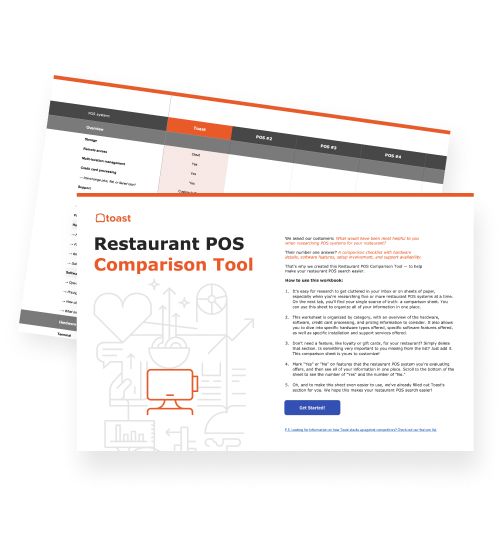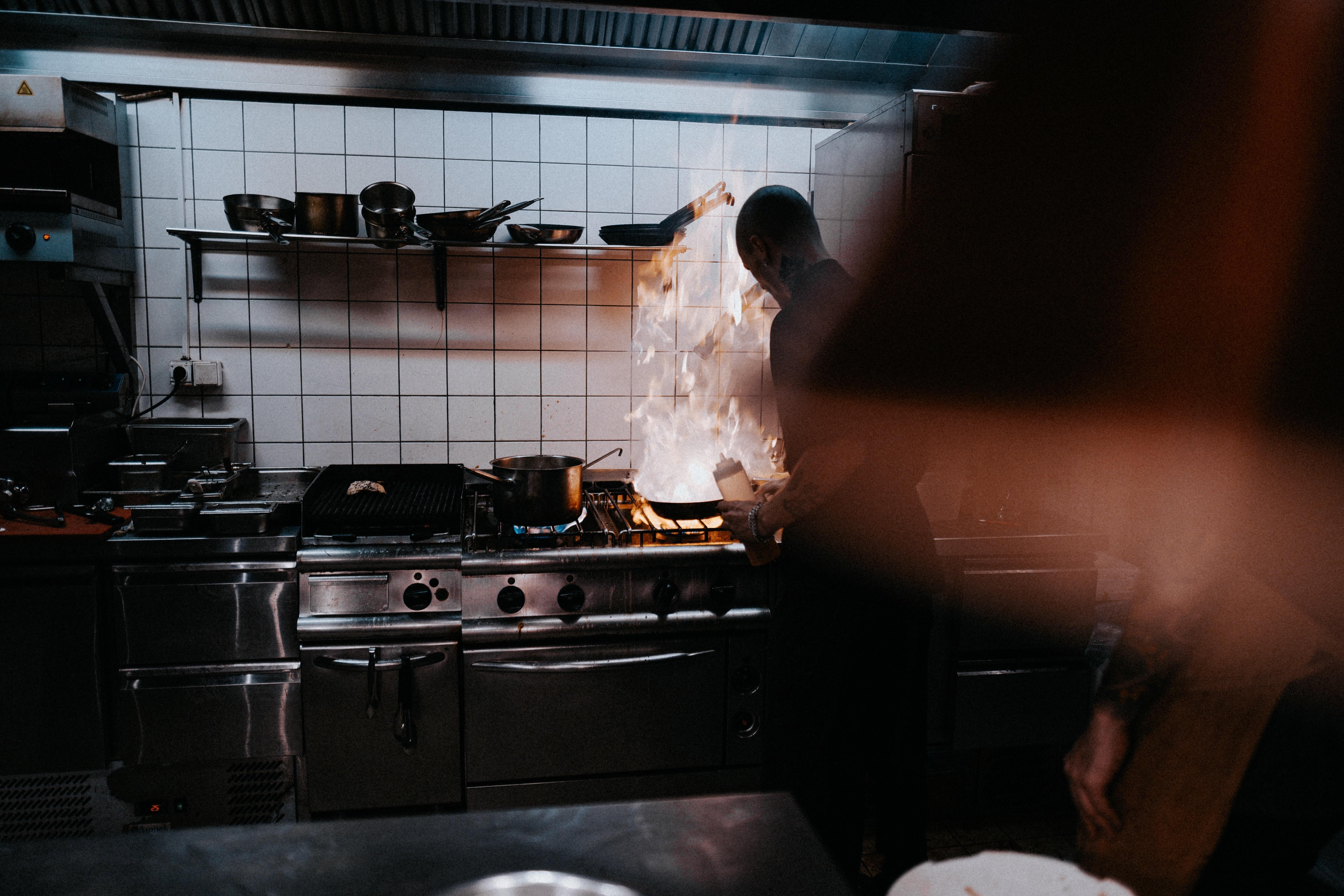
Essential Donut Shop Equipment List: Equipment Needed to Start a Donut Shop
Bring your dreams to life with this ultimate donut shop equipment guide.
Tyler MartinezAuthor

Restaurant POS Comparison Tool
A free, customizable Restaurant POS Comparison Tool to research and compare point of sale systems in one Excel spreadsheet.
Get Free Download | Built for Restaurants
| Built for RestaurantsDon’t be fooled into thinking donut shops are simple compared to other bakery business models. Truthfully, making donuts requires specialized equipment, especially if you wish to expand your menu and offer coffee and other café staples.
As part of your donut shop’s business plan, consider what equipment you need to produce donuts and other bakery items. Remember to create a budget for these goods, too. Our comprehensive donut equipment guide covers all of this and more.
What’s in This Guide?
Essential Donut Equipment List
Donut Equipment Costs
What to Consider Before Buying Donut Equipment
Detailed Donut Equipment Checklist
You’re Ready to Open a Donut Shop
FAQs
Restaurant Business Plan Template
No matter where you’re at in your restaurant ownership journey, a business plan will be your north star. Organize your vision and ensure that nothing is overlooked with this free template.

What Donut Equipment Do You Need?
While ovens and deep fryers are undoubtedly important, the scale and menu of your business will determine what additional donut equipment you need, such as:
Deep Fryers
Ovens
Assembly Equipment
Ranges and Grills
Ventilation
Microwaves
Freezers and Refrigerators
Coffee Brewers
Food Prep Surfaces
Food Prep Equipment
Knives
Cutting boards
Pots and pans
Food processors
Blenders
Mixers
Storage containers and shelving
Safety Equipment
Gloves
First aid kit
Date labels
Sani-buckets
Bar rags
Food-grade cleaning supplies
Chemical safety data sheets
Sinks
Compartment sinks
Disposal sinks
Handwashing sinks
Restaurant Point of Sale System
Kitchen Display System (KDS)
Service wear
Display cases
Table service essentials
Paper boats and plates or clamshells
Utensils
Napkins or linen
How Much Does Donut Equipment Cost?
We understand it’s a long list and looks quite daunting. It depends on what you want to offer customers at your bakery. For example, if you want to focus on making donuts, the overall cost will be lower than if you wanted to produce coffee and other sweet treats.
Generally, you can expect to spend anywhere between $15,000 to $30,000 to fully equip your donut shop. To keep your budget in check, it can be helpful to explore restaurant financing options.
What to Consider Before Buying Donut Equipment
Equipment is one of the largest investments for any bakery. It’s also one of the most crucial since it can directly impact the quality of your donuts as well as how quickly and efficiently you produce them.
Decide which pieces of donut equipment to prioritize and where you can compromise when it comes to budget.
1. Quality
The quality of your equipment, whether it be deep fryers or stand mixers, plays a huge part in the success of your business. Having good equipment maintains reliability so that you can produce consistent results in terms of donut quality and time spent making them. Carry out in-depth research into durable equipment made from high-quality materials and ask other donut-making professionals and bakery owners for recommendations.
2. Space
Donut shops are traditionally small spaces, with just enough room for the kitchen and prep area, a service counter, and maybe a few café tables.
Consider the amount of space your bakers will need and if the kitchen is capable of fitting every piece of donut equipment you buy. If not, choose alternatives that are either smaller or reorganize your layout.
3. Planning Your Kitchen
When designing the bakery layout, carefully consider where the donut equipment will go and how your employees will use it. For example, a big machine may be great at making donuts in record time, but if it’s blocking a doorway, this will only cause more harm than good.
To make your place easy to maneuver and efficient at donut making, you may want to consult a kitchen planner who can help you create an efficient space.
4. Use and Cleaning
Some kitchen equipment will last a lifetime if maintained properly. That’s if you choose the right supplier however. To save you from future headaches and money, ask your supplier about maintenance and select donut equipment based on how easy it is to repair.
Train your staff to clean equipment properly, allowing it to stay in top condition for a long time. Also, look out for the NSF symbol on food equipment, which signifies that it meets food safety certification standards.
5. Suppliers
Well-designed donut equipment made form high quality materials are critical to the success of your donut making business. For easy access to these machines, build a rapport with your equipment supplier.
Many towns and cities have a local bakery or, specifically, donut shop supply stores that, for a membership fee, offer premium rangers of commercial equipment at near wholesale prices.
The best suppliers will be honest about the condition of the products they sell and provide everything you need – including installation, maintenance, and repairs.
Sourcing Donut Equipment
Once you have a comprehensive donut equipment list and a vision of your fully equipped store, start shopping around.
Keep in mind that local wholesalers often have good deals. You can also lease from a reputable online retailer or rent equipment until you can afford to invest.
New vs. Used Equipment
Some expensive (and essential) pieces of equipment might actually be better to purchase second hand. Consider looking for an oven or deep freezer that has been well-maintained over the years.
6. Pricing
Decide how much to budget for less essential equipment. For instance, you will likely be able to pay less for coffee makers, which go really well with donuts and other sweet produce. However, they aren’t the main thing you offer customers.
7. Financing or Leasing
You will find that financing or leasing equipment allows you to take on less risk until you know your business will take off. Lease payments can be tax-deductible just like equipment purchases and let you to be financially liquid when you’re ready to open your store.
Restaurant Opening Calculator
This calculator lays out some of the fundamental financial costs of opening a restaurant, so you can start planning and bring your dream restaurant to life.

Ultimate Donut Shop Equipment Checklist
Once you have considered things such as planning your space and finding suppliers, you’re ready to delve into the nitty-gritty of what equipment you need and why you need it.
The items you choose to prioritize depend on your business style, but this checklist is a great foundation to work with.
1. Deep Fryers
Deep fryers are front and center in donut shop kitchens. They can be electric, but a gas-powered deep fryer is likely more efficient for the volume needed in a donut shop, resulting in overall better reliability.
Choose a commercial deep fryer that is capable and big enough to match demand. The machine must also meet safety standards, and is durable so it won’t require a lot of maintenance.
2. Assembly Equipment
Look for donut equipment that will make your baker’s lives easier. This includes devices that drop uniform batches of batter into the fryer, and large racks allowing for an icing and decoration space to give them time to cool.
3. Ovens
Consider investing in a powerful commercial combination oven that can bake fresh donuts evenly while keeping them moist with steam.
4. Ranges and Grills
You can’t make fresh curds, custards, and fillings without a heat source. Induction burners generate an electromagnetic current to heat a surface. Magnetic metals transfer heat the best and can be used to heat glass or other surfaces.
Induction is sustainable, versatile, and saves space. It is also a cost-effective option, especially if your menu won’t require multiple burners.
5. Ventilation
Bakery kitchens require ventilation, so they don’t get filled with the heat and smoke from ovens and ranges. Ensure that your ventilation system has enough power to provide a safe kitchen environment.
6. Microwaves
Great for reheating or quickly steaming, bakeries and donut shops often rely on microwaves.
7. Freezers and Refrigerators
You’ll need to store perishable stock like milk and butter. Consider a walk-in cooler to keep ingredients organized and accessible. You might also place a cooler in the lobby with iced coffee or bottled drinks for customers.
8. Coffee Brewers
There’s a large profit margin on coffee. Invest in a couple of commercial coffee brewers and consider offering a dark roast and a decaf from a local business.
9. Food Prep Surfaces
When planning the layout of your donut shop, provide enough clear counter space for your employees to work. Consider how many team members will be in the kitchen and how much space is needed for them to do their tasks with ease.
Stainless steel prep counters are classic in kitchens as they are easy to sanitize and won’t transfer unwanted heat to products. Poured concrete is a cost-effective alternative and just as durable, or you can choose wood or granite.
10. Food Prep Equipment
Don’t forget small appliances, utensils, mixing bowls, microplates, and more to ensure your donut-making shop is kitted out with everything it needs to make glazed, sweet treats. This equipment may include:
Knives: Find a set of knives and learn how to properly keep them sharp for both safety and efficiency. You’ll also want a sharpening stone to keep it in good condition.
Cutting Boards: Quality cutting boards make a noticeable difference in the prep experience. Choose ones with lips around the edges to contain liquids or with handles to make it easy to carry.
Pots and Pans: Buy pieces made from high-quality materials that will become assets to your kitchen. Pots and pans are essentials that last a long time when maintained properly.
Food Processors: Food processors are great for liquefying soups and sauces which may prove useful when making glazed donuts or soft condiments. They also ensure you get an even chop or mince.
Mixers: Stand mixers offer an easier, more time efficient way to prepare large batches of donuts or brownie batter.
Storage Containers and Shelving: Storage is always a must for safety and organization. Store and arrange ingredients such as yeast and other produce for certain dishes or drinks near the spaces where they’ll be prepared.
Miscellaneous: This is probably the most important category – the rest. Piping bags, cooling racks, parchment paper…the little things add up, so it’s crucial to plan and budget for them. Certain tiny items are easily misplaced, so buy backups.
11. Safety Equipment
All bakeries and donut shops are held to food safety standards and must have certain equipment on hand, such as:
Gloves
First aid kits
Date labels
Sani-buckets
Food-grade cleaning supplies
Chemical safety data sheets
12. Sinks
Sinks are necessary for prep, cleaning, and disposal. You’ll need to equip both your bakery counter and kitchen with sinks.
Compartment Sink: Three-compartment sinks are generally needed to meet food safety standards for washing and sanitizing.
Disposal Sink: Disposal sinks, also often called bar sinks, are conveniently located to catch any liquid that needs to be discarded.
Handwashing Sink: Dedicated handwashing sinks must be available for employees, allowing them to maintain safe food handling standards.
13. Restaurant Point of Sale System
Crucially, Point of Sale (POS) systems provide a way to integrate inventory management, budgets, sales reports, and communication between all areas of the donut shop. Keep everything running smoothly with cutting edge interfaces to ensure consistent results when making donuts and pleasing customers.
14. Kitchen Display System (KDS)
Kitchen display systems let your bakers know what customers are ordering in real time.
Your KDS sends orders to bakers from cashiers. They’re integrated with your shop’s point-of-sale system to keep everything in order and ready to maintain smooth, efficient service.
15. Servicewear
While donut shops are traditionally grab-and-go spots, some shops have extended their menus and level of service. Depending on your business model, here are some important donut equipment items to help give customers the best server experience.
Display Case: Glass display cases are a great way to showcase fresh stock in a donut shop. Create impressive displays that entice your customers.
Table Service Essentials: If you set up tables in your donut shop, be sure to offer all the essentials of table service – plates, utensils, appropriate seasonings, or condiments – and consider those things when creating the store budget.
Paper Boats, Plates, or Clamshells: Necessary for grab-and-go or take-out services, this single-use servicewear may be expensive, but lets you offer a sought after service to customers.
Takeout Utensils: Single-use utensils are surprisingly expensive for donut shops and bakeries – plastic cutlery adds up. Save money by asking each customer whether or not they need utensils.
Napkins or Linen: Keep your customers, staff, and store space clean with napkins and linen. They are essential, so be sure to budget for them.
Cafe and Bakery POS Comparison Tool
A free, customizable Cafe and Bakery POS Comparison Tool to research and compare point of sale systems in one Excel spreadsheet or editable PDF.

You’re Ready to Open a Donut Shop
Knowing what donut equipment you need for your store is challenging, especially if it’s your first business. However, with some careful planning on your part and some knowledge on ours, we can work together to figure out what equipment you need for your unique donut shop.
Remember to budget appropriately with plenty of leeway to ensure you can buy equipment made from high quality materials and are capable of keeping up with donut making demand with consistent results. Pay attention to list price on wholesale sites and compare it to competitors to get the best deal.
Also be mindful that at one point or another, a machine may break down and need repair or even replacement, so train your staff how to use, clean, and maintain it properly.
Don’t forget about the other parts that make a donut shop special, including servicewear and a POS system, which will revolutionize how you operate your business.
FAQs
What are the components of a donut?
A traditional donut has three staple ingredients, salt, flour, and water. Additional components are commonly milk, eggs, sugar, fat, and flavoring depending on the donut. Yeast and chemical agents are used to create leavened donuts batter.
What equipment is required to make donuts?
To make fresh donuts, you’ll need a variety of equipment items, including:
Mixers: Measure and combine ingredients with cups, spoons, and mixing bowls. If you have a donut-making store, you can buy big automated mixers.
Donut Cutter: Slice the dough off into consistent-sized balls.
Oven or Fryer: A bakery convection oven or specialty fryer is essential for cooking the donuts.
Cooling Rack: Place the donuts aside in an area to cool off before serving, storing, or decorating.
How much does it cost to make a donut from scratch?
Depending on the donut and the size of the operation, you can expect to spend, on average, 10 cents to make one donut. This will increase dramatically if you are continuously batch-making donuts.
Related Donut Shop Resources:
Is this article helpful?
DISCLAIMER: This information is provided for general informational purposes only, and publication does not constitute an endorsement. Toast does not warrant the accuracy or completeness of any information, text, graphics, links, or other items contained within this content. Toast does not guarantee you will achieve any specific results if you follow any advice herein. It may be advisable for you to consult with a professional such as a lawyer, accountant, or business advisor for advice specific to your situation.
Read More
Subscribe to On the line
Sign up to get industry intel, advice, tools, and honest takes from real people tackling their restaurants’ greatest challenges.
By submitting, you agree to receive marketing emails from Toast. We’ll handle your info according to our privacy statement. Additional information for California residents available here.


